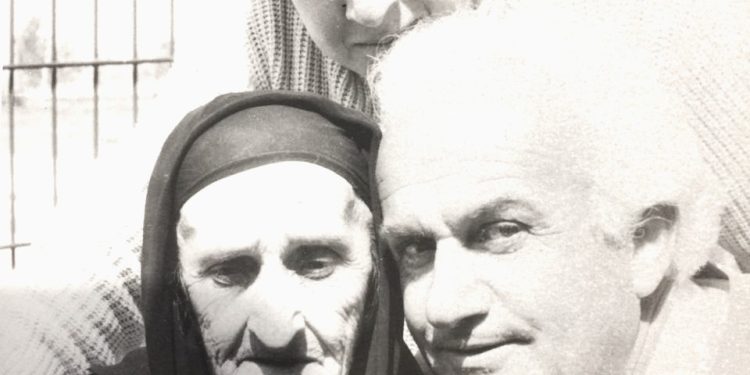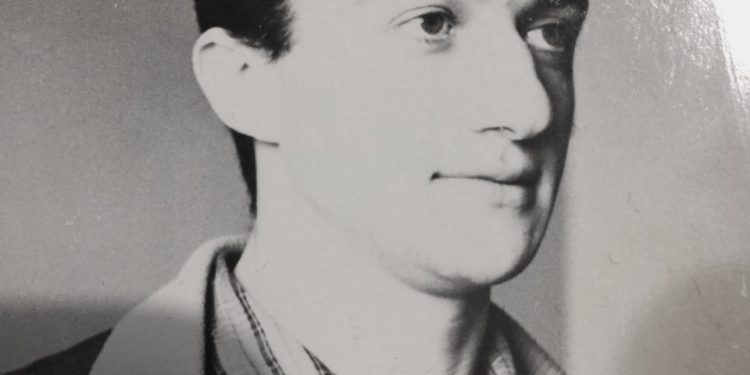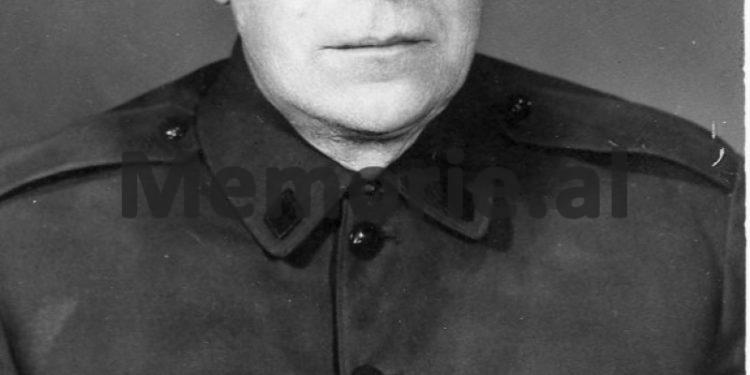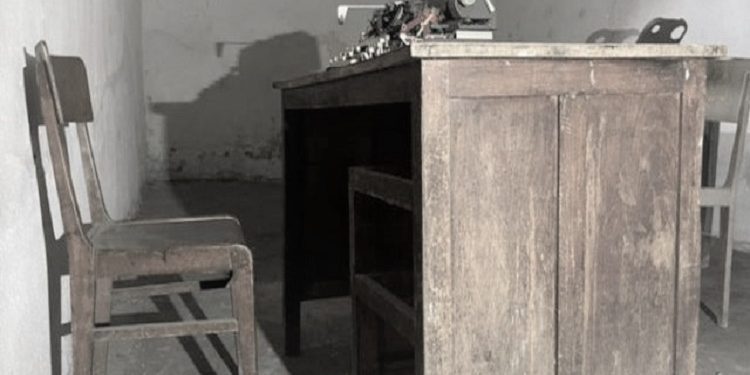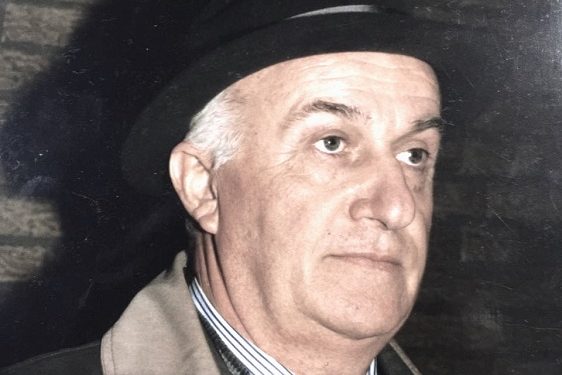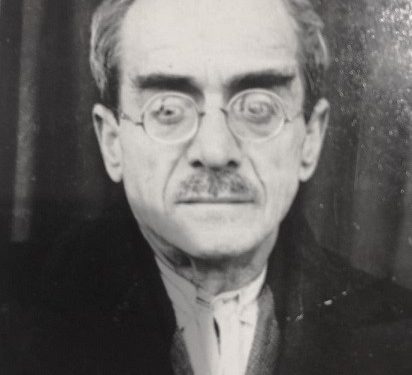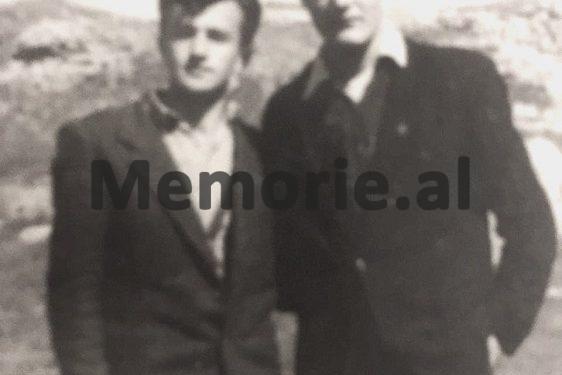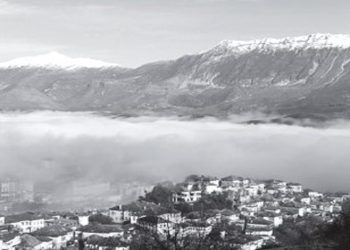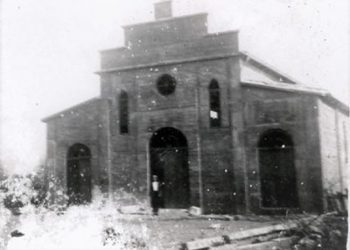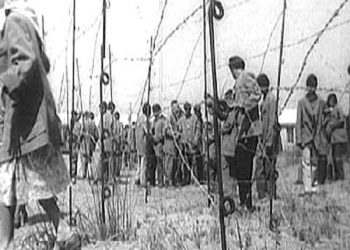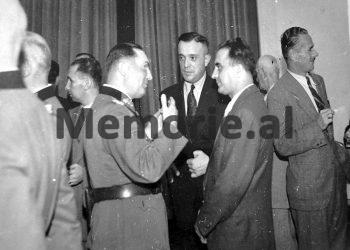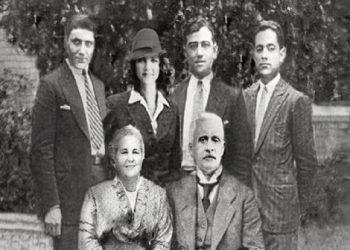From Sokrat Shyti
Part Eighteen
Memorie.al / The writer Sokrat Shyti is the “great unknown” who, for several years, has revealed the tip of the iceberg of his literary creativity. I say this based on the limited number of his published books in recent years, primarily the voluminous novel “Nata fantazmë” (Tirana 2014). His novels: “PËRTEJ MISTERIT”, “MES TUNDIMIT DHE VORBULLËS”, “GËRRYERJET E MAKTHIT”, “HIJA E TURPIT DHE E VDEKJES”, “KOLONELI KRYEDHJAK”, “SHPRESAT E NËMURA”, “PËSHTJELLIMET E FATIT” I, II, “MBIJETESA NË KASOLLEN E LOPËS”, as well as other works, all novels ranging from 350 to 550 pages, are in manuscript form waiting to be published. The dreams and initial excitement of the young novelist, returning from studies abroad full of energy and love for art and literature, were cut short early on by the brutal edge of communist dictatorship.
Who is Sokrat Shyti?
Having returned from studies at Moscow State University, right after the rupture of Albanian-Soviet relations in 1960, Sokrat Shyti worked at Radio “Diapazon” (which at that time was located on Kavaja Street), in an editorial office with his journalist friends – Vangjel Lezho and Fadil Kokomani – both later arrested and subsequently executed by the communist regime. Besides the radio, Sokrati, at the age of 21, if we may imagine, had passionate literary interests at that time. He wrote his first novel “Madam doktoresha” and was on the verge of publication, but… alas! Right after the arrest of his friends, to fill the cup, a brother of his, a painter, fled abroad.
Sokrat was arrested in September 1963, and in November of that year, he was sent into internment (together with his mother and younger sister) to a location between Ardenica and Kolonje in Lushnja. For 27 consecutive years, the family lived in a livestock shed made of reeds, without windows, while Sokrat was subjected to forced labor. During these 27 years, he was legally obligated to report three times a day to the regional authority. He had no right to move from the place of internment and was deprived of any kind of documentation, etc. In these conditions, among a livestock shed, he gave birth and raised his children. It was precisely from this event, or rather a very long history of persecution, that he was inspired to write the book “Survival in the Livestock Shed”!
Agron Tufa
Continued from the previous issue
EXCERPT FROM THE BOOK, “SURVIVAL IN THE COW SHED”
– “My brother never spent the night at home due to the cramped conditions. We have only one room. He sleeps in his studio in the Old Bazaar. Even though we are brothers, we see each other once in a while; we don’t have the chance to talk to one another…” – I added, as if to say: “Why should we rummage around for something I don’t even know?”
Fortunately, this response seemed to have some effect: it somewhat softened his manner towards me, he didn’t raise his fist to hit me and didn’t shout like a deranged person. But he was content to order me in a rough tone:
– “Since you are a capable journalist, you should have the means to describe the course of events without complications or fabrications; I won’t engage in questions and answers that aggravate me. Here are blank papers and a pencil on the table. Write everything you know about your brother, sparing no details, because this fool deserves nothing humane, considering that he has caused you grief while we have borne the shame.
In the end, you must thoroughly express your and your family’s impressions regarding this vile act of treachery against the homeland. As for your future, I believe you can guess: from this moment on, the descent into a pit has begun, the depth and length of which remain unknown…”?! The final determination struck me like lightning and stiffened my body for a few minutes, much like what happens when one is injected with anesthesia! The colonel continued to clearly state, as if narrating something interesting, that from this moment on, the course of my life would head towards a forced abyss!
– “Understand this clearly: all your dreams will turn to ashes and dust! Your desires to be a renowned writer will dissolve in the wilderness of oblivion!… Where you will be exiled as a family, there will only be desolation and despair, ruling reason and action! Thus, your mind will inevitably be clouded by harsh winters, with terrifying frosts akin to those in the North Pole, which will solidify your literary creative projects! And the crushing pressure of the Dictatorship of the Proletariat will keep them suppressed until they turn to coal!” …
Before I could leave the “ruin” room, the colonel ordered me not to meet anyone outside of my family, including neighbors.
– “Otherwise, you will add even more severe troubles to yourself!… As for the decisions regarding your future, we will notify you in due time. This is our concern…” – he mocked with a grin. – “Never forget: wherever you go, our shadows follow you even to the bathroom!… Keep this in mind today and forever, until your last signature.
He, that sycophantic fool, chose the shameful path of escape for himself, knowing full well that the family members would be exiled where the hens peck stone! But first and foremost, he has ruined your future! Does that fool think that in escape, life will be pleasant? The curse of the homeland will follow him like a ghost: he will never prosper!”
– “Can I leave?” … – I asked in a faint voice.
– “Go, but with your head on straight. Keep my orders in mind. If anyone asks you who questioned you at ‘Selvia,’ you will respond: I don’t know. Surely you aren’t so naïve as to tell how you fainted and the investigator splashed water on your head to wake you up. Or how this one got angry and punched you in the nose…”?!
When I stepped onto the street, it felt as though all the passersby were looking at me with troubled gazes: some pitied me, while others murmured thoughts that contradicted one another. Because in general, it was somewhat known, or could be inferred, what was happening inside the three-story building at ‘Selvia’: when those who had been summoned emerged from here alone, they were undoubtedly disfigured, just like what happened to me. Except for other cases, where they pulled out the apprehended ones themselves to take them to cells after having tortured them.
I had no doubt that the news of my brother’s escape was spreading with the speed of sound, and everywhere the gossip revolved around our family. Besides the expressions of amazement (how could this madness have been done by that short painter?!), the question was whispered: into what abyss would they throw us?! Some were convinced that important ministries must have been informed, including the Writers’ Union, to take preventive measures: To halt the publication of writings in my name! To check the magazine “Nëntori”, the newspapers “Drita”, “Zëri i Rinisë”.
“Urgently remove from circulation the issues containing fragments from my manuscripts, which have not yet been published as a separate volume. And especially scrutinize with a magnifying glass the manuscript of the novel ‘Madam Doktoresha,’ which has been circulating among the editorial offices for several months. Because in this manuscript, there must be one or more questionable doubts hidden between the lines, serving as evidence to arrest me!
It’s perfectly natural that after such a devastating blow, I could not return to work. And since I had no other place to go besides home, I continued my creeping walk along ‘Kavajës Street,’ under the tormenting urge that the hyenas were surely prowling, ready to sink their teeth into my poor mother, threatening her fiercely that the fury of betrayal caused by the escape of her middle son would be poured out upon the youngest son unless she showed readiness to assist them; otherwise, they would exile her entire family to desolate corners, where the bandits used to divide the stolen goods!
But no matter how much they threatened her, I had complete faith in her courage and strength, that she would not be broken by their threats, and she would never think to beg for mercy or say, ‘put your hand on your heart!’ Because she knew from her bitter past how the communist leaders treat young people who do not fulfill their satanic goals: that the party members and powerful rulers, like beasts, are ready to tear us apart when their interests and privileges are jeopardized, and they become furious when the tenets of the Dictatorship are publicly denied:
‘Only in the People’s Socialist Albania is life the happiest in the world!’ I was certain that when asked, ‘Where is your second son?’ my mother must have replied cunningly:
– ‘You should tell me that, as he spends the night with you! If you don’t know, how could I know, as he only shows up here once a week, just to wash up!’
I scolded myself for spending time with speculations about how my mother endured the double blow of the stealthy departure of her second son, especially the terrible consequences that would follow for the innocent family members. The most important thing was to know what they had thrown into our only room, what terrible pain they had caused during the raid! There is nothing more horrifying for a mother than to be humiliated and scorned, to be called ‘the mother of a traitor,’ when she is in fact a very respectable woman, ‘the mother’ of a partisan, who during the National Liberation War turned her home into an important illegal base for supplying the brigades with war munitions!…
Only in states with brutal regimes does such ingratitude manifest itself. The contributions of statesmen during periods of historical turning points, such as the patriotic fight against foreign Nazi-fascist occupiers, are denied. The sacrifices of honorable patriotic families are erased with a swipe of the pen, merely because one member publicly demonstrated, through the act of fleeing across the border, an open opposition to an ideology that is continually plunging us deeper into the shell of isolation and forcibly separating us from human progress with the terribly cruel laws of the Dictatorship of the Proletariat!…
I had never seen, envisioned, or imagined our room in such a terrifyingly horrible state, where every piece of furniture and equipment was overturned, thrown about, and destroyed, as if a satanic storm had entered and wreaked havoc! This sight sent shivers through me to the roots of my hair! I had never experienced such a haunting pain as this that seized me when I saw my mother kneeling on the carpet, and as soon as she felt my footsteps, she turned her head and, with a deep sigh, let out her most poignant lament:
– ‘What has the sycophant done to us, what has he done to us?!’”
I sat down beside her, filled with nostalgia and tried not to break down, hoping that my presence would comfort her and lessen the pain of humiliation, with the hope that perhaps I could give her the courage to confront the terrible calamity.
– “Are you coming straight from work, or?… I’ve become quite muddled. I’m talking nonsense. They must have beaten you, right?! How did I not notice your wet hair and soaked clothes? I can guess: you fainted from the shock and the executioners splashed water on you to bring you back to your senses. Then they must have beaten you!”
– “But how did they treat you?” – I asked to avoid the bitter reply.
– “The pigs are on the loose. Wolves and jackals are the same everywhere. Do you understand where they will send us?” … – she added with an anxious glance.
– “When they exile us, the place won’t matter, but the label that will follow us does. From this moment, we are to be declassified, meaning creatures without identity and with no civil rights! They call us vermin, the dregs of society!” …
– “Look what the sycophant has done to us!”… – my mother sighed deeply, as her chest sank. – “What do you think: did he lose his mind, running away like a coward?!”
– “He showed that his self-interest overrides reason and pain!” – I replied.
– “He knew better than others that families will pay dearly when someone’s head gets hot and breaks from the pressure!” … – my mother added.
– “His actions prove that he only thought of himself… – I countered. – Because I cannot believe he is so irresponsible as to deny that he is the cause of this chaos and that he cannot imagine where our family will end up from now on! But for us, only one fact matters: what happened cannot be undone. As you often say: it seems it’s written that we must suffer. We need to prepare ourselves: a terribly difficult future awaits us! Did they take my manuscripts?” .. – I asked, quite shaken.
– “They pounced straight into the library. Don’t you see how they have messed up the books? They left no book untouched, shaking and leafing through everything. All your writings were thrown into a suitcase, along with Guno’s letters.
– “They don’t need your son anymore. Where you will be going, there is no need for pen or paper…” – they said, grinning.
– “Where you are going, it won’t even occur to him to write, let alone think of his friends in Moscow…”!
– “Come sit on the bed, or you’ll catch a cold on the floor.”
“I’m putting the books back on the shelves and then tidying up a bit, to somewhat diminish the shocking appearance of this bitter incident. We must give ourselves courage, considering that unknown surprises await us, which we will inevitably have to face, as the only way to survive…”! – And I sat down on the bed to organize the terrifying aftermath with trembling hands.
(To escape the anguish from this deadly reality, I made an effort and shifted my memories to my student years, the day I first met Guno Mukerje, the talented and wise Indian, the grandson of the great Tagore. The acquaintance was made at the entrance of the Indian Bhattacharya, my neighbor, where I was invited for lunch in an intellectual gathering, where contemporary literature was the central discussion. The conversation took place in three languages: Hindi, English, and Russian.
The discussion mainly focused on the romantics and the prominent classics of Russian literature, without touching upon the new current of socialist realism after the October Revolution. Professor Guno appreciated my opinion, approached me and asked in Russian: “Why are you continuing your studies in the Chemistry faculty when your inclination and desires clearly lean towards literature?”
I sat down next to her, overtaken by emotion, and tried not to break down, hoping that my presence would comfort her and lessen the pain of humiliation, wishing that perhaps I could give her the courage to face the terrible calamity.
– “Are you coming straight from work? … I’ve become completely muddled. I’m speaking foolishness. They must have beaten you, right?! How did I not notice your wet hair and soaked clothes?! I can guess: you fainted from the shock and the executioners splashed water on you to bring you back to your senses. Then they must have beaten you!”
– “But how did they treat you?” – I asked to deflect the bitter reply.
– “The pigs are on a rampage. Wolves and jackals are the same everywhere. Do you realize where they are going to send us?” … – she added with a troubled look.
– “When they exile us, the location doesn’t matter, but the label that will stick to us does. From this moment on, we are to be declassified, meaning creatures without identity, with no civil rights! They call us vermin, the dregs of society!” …
– “Look what that sycophant has done to us!” – my mother sighed deeply, as her chest sank. – “What do you think: did he lose his mind, running away like a coward?!”
– “He showed that his self-interest overrides reason and pain!” – I replied.
– “He knew better than anyone that when it comes to families, the price paid will be steep when someone’s head gets hot and breaks from pressure!”… – my mother added.
– “His actions prove that he only thought of himself… – I countered. – Because I cannot believe he is so irresponsible as to not recognize his role in this chaos and that he cannot imagine where our family will end up from now on! But for us, the only fact that matters is that what happened cannot be undone. As you often say: it seems it is written that we must suffer. We need to prepare ourselves: a terribly difficult future awaits us! Did they take my manuscripts?” .. – I asked, quite shaken.
– “They rushed straight into the library. Don’t you see how they have messed up the books? They left no book untouched, shaking and leafing through everything. All your writings were tossed into a suitcase, along with Guno’s letters.
– “They don’t need your son anymore. Where you will be going, there is no need for pen or paper…” – they said, grinning.
– “Where you are going, it won’t even occur to him to write, let alone think of his friends in Moscow…”!
– “Come sit on the bed, or you’ll catch a cold on the floor.”
“I’m putting the books back on the shelves and then tidying up a bit to somewhat diminish the shocking appearance of this bitter incident. We must give ourselves courage, considering that unknown surprises await us, which we will inevitably have to face, as the only way to survive…”! – And I sat down on the bed to organize the overwhelming aftermath with trembling hands.
(To escape the anguish from this deadly reality, I made an effort and shifted my focus to my student years, the day I first met Guno Mukerje, the talented and wise Indian, the grandson of the great Tagore. The acquaintance was made at the entrance of the Indian Bhattacharya, my neighbor, where I was invited for lunch in an intellectual gathering, where contemporary literature was the central discussion. The conversation took place in three languages: Hindi, English, and Russian.
The discussion mainly focused on the romantics and the prominent classics of Russian literature, without touching upon the new current of socialist realism after the October Revolution. Professor Guno appreciated my opinion, approached me, and asked in Russian: “Why are you continuing your studies in the Chemistry faculty when your inclination and desires clearly lean towards literature?”
In the end, despite the gnawing of these speculations, I told myself not to miss this chance. At least let’s meet face to face, considering that in the future, opportunities like this would not exist. So, I went. But this goal was not fulfilled either, as the Secretary General of the Writers’ Union was not in Albania; he was abroad as part of a delegation. Thus, this opportunity was lost. However, even if the meeting had taken place, my attention would mainly revolve around the fate of the manuscript of the novel “Madam Doktoresha,” in whose hands it now lay and what impression prevailed until now?!
Then, at the end, I would pose the most important question: is there any way to save it from destruction?… Surely, the writer would sense from my question what troubled me the most: not just the clandestine survival of the manuscript of the novel, but the attempts of the cynics to smear and label it as a “work lacking the spirit of socialist realism,” the most common trick for manipulative scribes.
The next morning, around 9 a.m., I found myself in the corner of the courtyard of the Ministry of the Interior, having been informed by the neighborhood postman. I was overwhelmed by terrifying feelings, believing that somewhere in my manuscripts, they had found ambiguous statements or thoughts (the most commonly used form to accuse someone), since behind every direct meaning, there is always a figurative twin, interpreted according to a specific agenda, to plunge it into informational darkness.
In my opinion, to bolster their accusations, they must have brought along specialized sociologists and psychologists, grave diggers of intellectuals, who use sharp satire and humor with popular nuances as their tools of conversation. In truth, this did not happen: only two officers in civilian clothes approached me, and the one with a lower rank held a black bag. “These must either be investigators charged with dealing with my family’s case or perhaps specialized experts for the accuracy of writing…” – I thought to myself.
– “I know you tortured us all night with these unwanted manuscripts of yours!” – complained the higher-ranking officer. – “Not even with a magnifying glass could we decipher them! Who the hell taught you to write so small and with such extraordinary density of lines?! Our eyes are bloodshot from the strain and we have gotten nowhere! But how do you read them yourself? Hand us a page to read here!” – he ordered his subordinate.
The subordinate took out a written page from the black bag, the one he had caught in his hand, and handed it to me. I quickly glanced at it and began to read without hindrance or difficulty. Memorie.al
To be continued in the next issue
Copyright©“Memorie.al”
All rights to this material are exclusively and irrevocably owned by “Memorie.al”, in accordance with Law No. 35/2016 “On Author’s Rights and Related Rights”. It is strictly prohibited to copy, publish, distribute, or transfer this material without the authorization of “Memorie.al”; otherwise, any violator will be held liable under Article 179 of Law 35/2016.




